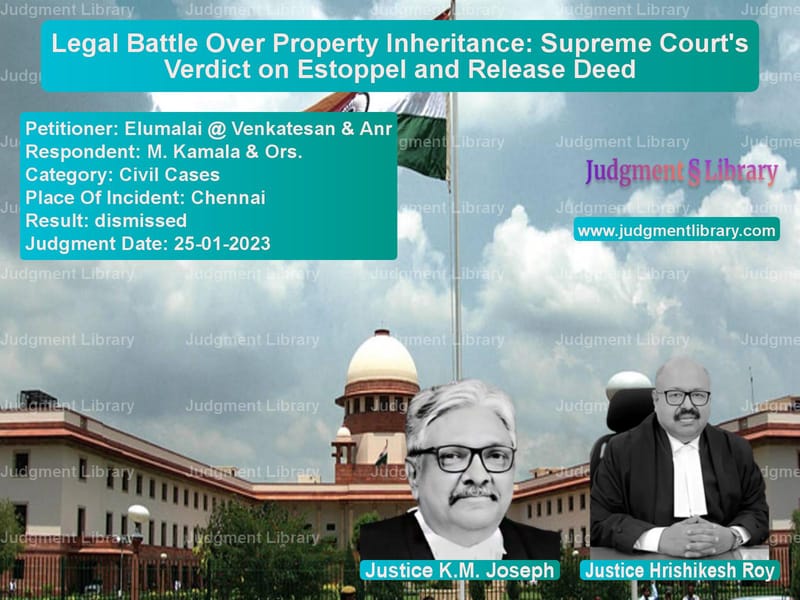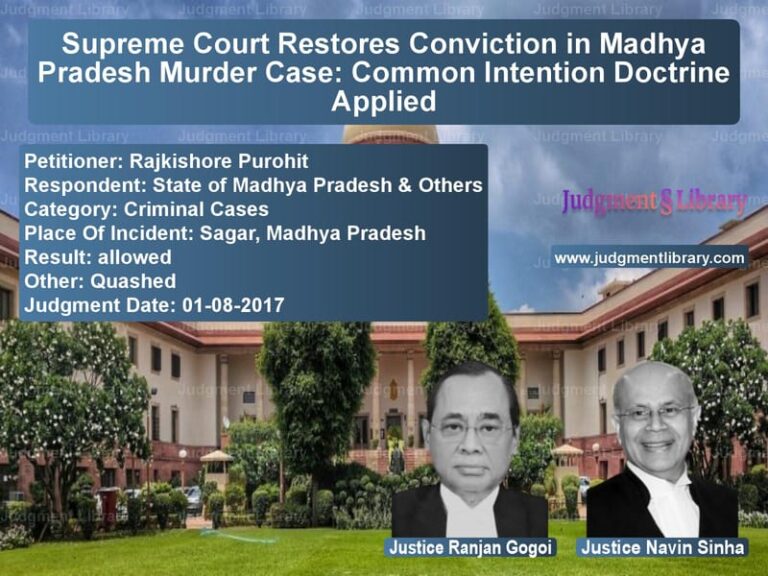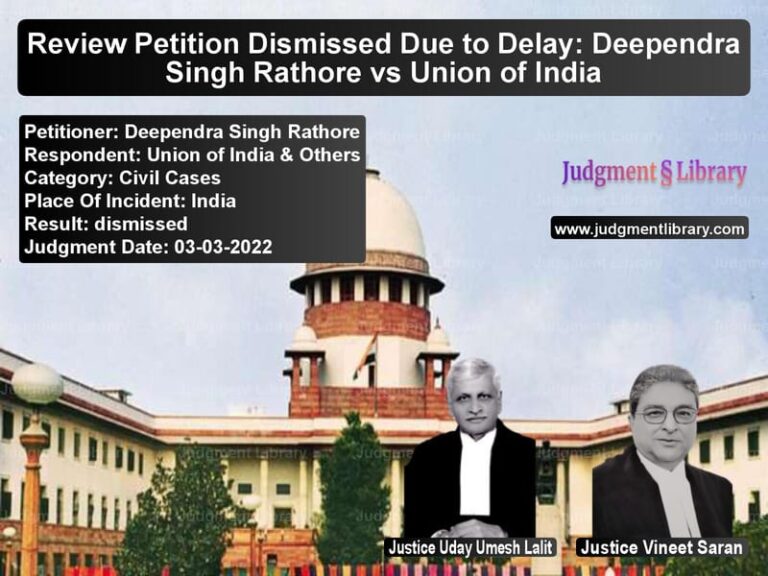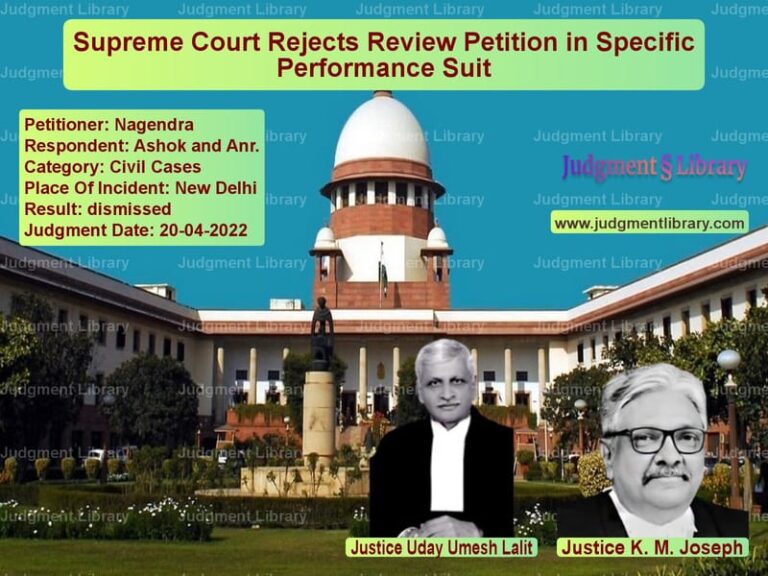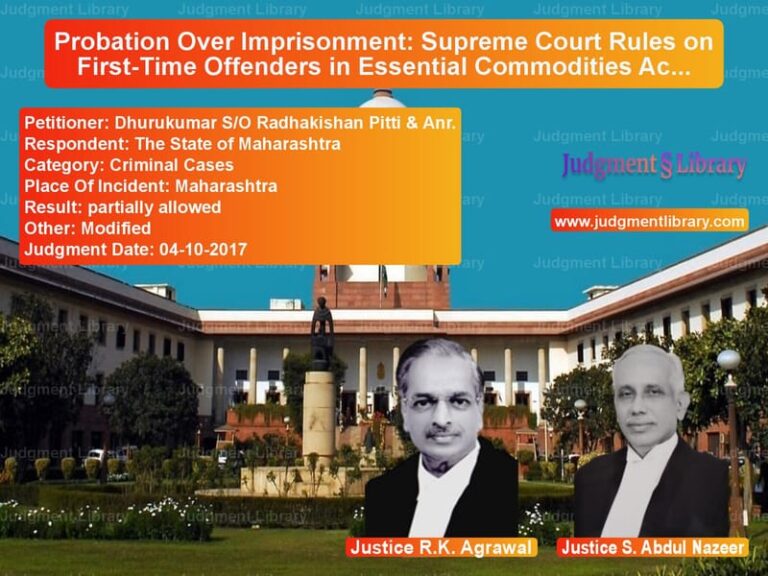Legal Battle Over Property Inheritance: Supreme Court’s Verdict on Estoppel and Release Deed
The case of Elumalai @ Venkatesan & Anr v. M. Kamala & Ors. revolves around a dispute concerning property inheritance and the enforceability of a release deed executed in 1975. The judgment rendered by the Supreme Court of India has reaffirmed the importance of legal doctrines such as the principle of estoppel and their application in succession law under the Hindu Succession Act.
The appellants, grandsons of Sengalani Chettiar, argued that their father’s release deed was void, as it was executed while their grandfather was still alive and had not vested any inheritable interest in the property. The respondents contended that the appellants were barred from making any claims due to the execution of the release deed and the consideration received therein. The court examined whether the release deed, in light of the doctrines of spes successionis and estoppel, could bar the appellants from inheriting the disputed property.
Background of the Case
Sengalani Chettiar, a resident of Chennai, was married twice. From his first marriage, he had a son named Chandran. From his second marriage, he had five daughters and a son. The dispute arose in relation to the A-Schedule property that was the self-acquired property of Sengalani Chettiar. Chandran, the father of the appellants, executed a release deed on November 12, 1975, relinquishing all claims in the property in favor of his father and half-brother.
Read also: https://judgmentlibrary.com/supreme-court-rules-on-land-acquisition-dda-vs-shakuntla-devi-case/
The release deed read as follows:
“I am the son of your first wife. As I could not be with you, I had received through the transfer of mortgage gold jewellery worth Rs. 10,000/- and materials valued at Rs. 5,000/-, and I release my share in respect of the house sites at Manamathi Village. The mortgage amount of Rs.10,500/- shall be settled by you. Hereafter, we do not have any connection except blood relation.”
Chandran passed away in 1978, and Sengalani Chettiar died in 1988. The second wife of Sengalani Chettiar, Kuppammal, passed away in 2005. The plaintiffs, Uma Ravi Chandran and Vinayaga Murthy, children from the second marriage, filed O.S. No.8173 of 2006 seeking partition. They argued that the appellants (defendants 4 and 5) had no right over the property due to their father’s release deed.
Legal Issues and Arguments
- Validity of the Release Deed: The appellants contended that their father, at the time of execution, had no vested interest in the property since his father was still alive, rendering the deed void.
- Application of the Hindu Succession Act: Under Section 8 of the Hindu Succession Act, 1956, they claimed their rightful share as Class I heirs.
- Doctrine of Estoppel: The respondents argued that the release deed estopped the appellants from asserting any inheritance rights.
Findings of the Trial Court
The trial court ruled that the release deed executed by Chandran was void since it was executed during his father’s lifetime. The court reasoned that:
- The property was self-acquired by Sengalani Chettiar, and Chandran had no inheritable rights at the time of execution.
- The release deed could not bar the appellants from claiming their grandfather’s property after his death.
- The trial court, therefore, ruled in favor of the appellants and granted them a rightful share in the inheritance.
High Court Reversal
The High Court overturned the trial court’s judgment and ruled against the appellants, stating that:
- The release deed, although not a valid transfer, created an estoppel preventing Chandran’s heirs from staking a claim.
- By receiving consideration, Chandran effectively relinquished his future claim to the property.
- The principle of estoppel prevented his heirs from challenging the agreement.
Supreme Court Judgment
The Supreme Court upheld the High Court’s ruling, emphasizing the principle of equitable estoppel. The court ruled:
- Under Section 6(a) of the Transfer of Property Act, spes successionis (expectancy of inheritance) cannot be transferred.
- However, as per the ruling in Gulam Abbas v. Haji Kayyam Ali, an heir who renounces their claim for consideration cannot later reclaim it.
- Chandran, by executing the release deed and accepting compensation, was estopped from claiming inheritance.
- Since Chandran was estopped, the estoppel extended to his heirs (the appellants), barring them from making any claims.
Conclusion
The Supreme Court’s decision reaffirmed that a release deed, even if not a valid transfer, can create a binding estoppel if consideration is exchanged. The judgment clarifies that an heir who renounces their claim in return for consideration is prevented from later asserting succession rights. This doctrine also applies to the heirs of the renouncing party.
Read also: https://judgmentlibrary.com/land-acquisition-case-supreme-court-overturns-high-courts-lapse-ruling/
Petitioner Name: Elumalai @ Venkatesan & Anr.Respondent Name: M. Kamala & Ors..Judgment By: Justice K.M. Joseph, Justice Hrishikesh Roy.Place Of Incident: Chennai.Judgment Date: 25-01-2023.
Don’t miss out on the full details! Download the complete judgment in PDF format below and gain valuable insights instantly!
Download Judgment: elumalai-@-venkatesa-vs-m.-kamala-&-ors.-supreme-court-of-india-judgment-dated-25-01-2023.pdf
Directly Download Judgment: Directly download this Judgment
See all petitions in Property Disputes
See all petitions in Succession and Wills
See all petitions in Specific Performance
See all petitions in Damages and Compensation
See all petitions in Judgment by K.M. Joseph
See all petitions in Judgment by Hrishikesh Roy
See all petitions in dismissed
See all petitions in supreme court of India judgments January 2023
See all petitions in 2023 judgments
See all posts in Civil Cases Category
See all allowed petitions in Civil Cases Category
See all Dismissed petitions in Civil Cases Category
See all partially allowed petitions in Civil Cases Category

